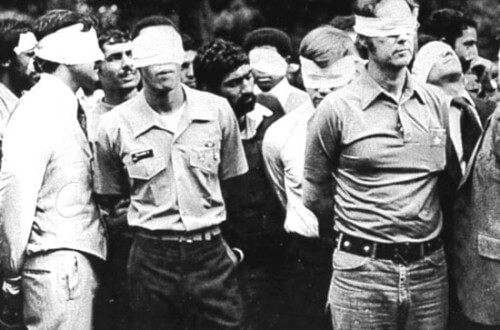Ricochet is the best place on the internet to discuss the issues of the day, either through commenting on posts or writing your own for our active and dynamic community in a fully moderated environment. In addition, the Ricochet Audio Network offers over 50 original podcasts with new episodes released every day.
 One More Helicopter
One More Helicopter
 During a recent press conference to discuss his cancer diagnosis, Jimmy Carter was asked about his presidency and what he would have done differently:
During a recent press conference to discuss his cancer diagnosis, Jimmy Carter was asked about his presidency and what he would have done differently:
“I wish I’d sent one more helicopter to get the hostages and we would have rescued them and I would have been re-elected,” Carter said. His response elicited laughter from the audience …
If you watch the video, it seems he’s joking a bit. Perhaps it only seems. James Earl Carter left the White House thirty-four and half years ago. To have provoked so immediate a response suggests that the failure of Operation Eagle Claw has been preying on his mind for decades. There is no phrase in the English language so terrible as “If only I’d…”
The unintended humour of the clip — which, perhaps, the 39th president missed — is that his fall from power is only partly attributable to the Iranian Hostage crisis. The crisis itself was a national humiliation for the United States, yet it so perfectly symbolized Carter’s vacillating leadership. Failing to send one more helicopter was simply one more example of Jimmy Carter’s executive maladroitness.
Let’s assume that one more helicopter had been sent, that Delta Force had been successful in rescuing the 52 American hostages in Tehran. It would have been regarded as a national triumph, a much-needed salvo after the psychological trauma of Vietnam. Carter’s leadership skills would certainly have been given a burnish. So what? President George H. W. Bush — riding high after the success of Desert Storm — had a crushing lead over his rivals going into 1992 campaign. We still wound up with eight years of sleazy Clintonesque scandals.
Operation Eagle Claw took place in April of 1980. Had the operation been a success it would have given Governor Reagan six months to whittle away at President Carter’s lead. Even in the aftermath of Eagle Claw, President Carter actually lead the polls for most of the 1980 campaign. What put Reagan over the top was his sterling performance in the debates. The final outcome was a ten point margin of Reagan over Carter. Had John Anderson dropped out, we might have seen a landslide foreshadowing 1984.
In 1980, the case for Jimmy Carter as a weak leader was damning, but the case for Jimmy Carter as an inept economic manager was decisive. Long before anyone heard of James Carville, the Reagan campaign understood that what mattered to Americans was the economy. Carter did not. Instead of projecting an air of concern for the hardships of the unemployed and the inflation pinched, Carter looked obsessed with a peace deal in the Middle East.
From the misery index to promises to cut taxes and shrink the federal government, the 1980 campaign demonstrated that, absent war, economics drives presidential campaigns. A generation and a half ago, American voters decided Ronald Reagan would be better at minding the store. History has vindicated that judgement. The GOP primary field — focused now on Hillary’s latest abuse of power — would do well to learn that lesson.
Published in History



But…but…but… Carter was the moral President. Right? Right?
And yet… what I wouldn’t give to have Carter as POTUS right now.